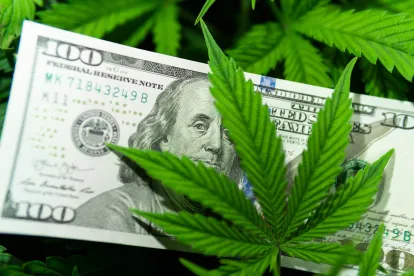Despite the cannabis industry’s explosive growth, many financial institutions have been hesitant to transact with cannabis-related businesses given the ambiguity created by divergent state and federal cannabis laws. The SAFE Banking Act seeks to remove these ambiguities at the federal level and pave the way for more financial institutions to serve the cannabis industry. But this is not the first time Congress has tried to pass the Act, and while bipartisan support has increased, obstacles to passage remain.
This article provides a brief overview of federal anti-money laundering laws and the SAFE Banking Act’s key provisions, analyzes the Act’s chance of passage, and provides key takeaways for financial institutions.
An Overview of Federal Anti-Money Laundering Laws
Federal anti-money laundering (AML) laws are the primary impediment to banks serving the cannabis industry. The Bank Secrecy Act (BSA) and its implementing regulations establish various recordkeeping and reporting requirements for national banks, federal savings associations, and agencies of foreign banks. As we previously explained, the BSA requires that a financial institution file a Suspicious Activity Report (SAR) when it knows, suspects, or has reason to suspect that a transaction involves funds derived from illegal activity. This would seemingly include any transaction involving funds derived from manufacturing, distributing, or dispensing cannabis, which is illegal at the federal level under the Controlled Substances Act (CSA).
Over the years, federal regulators have issued a series of guidance memoranda attempting to clarify when a bank must file a SAR regarding its cannabis customers. In 2013, the Department of Justice issued a memorandum for all United States Attorneys providing guidance regarding cannabis enforcement, better known as the “Cole Memo.” In response to the Cole Memo and the growing number of states legalizing cannabis under state law, the Financial Crimes Enforcement Network (FinCEN) issued guidance that sought to “clarif[y] how financial institutions can provide services to marijuana-related businesses consistent with their BSA obligations” (FinCEN Guidance) in 2014. The FinCEN Guidance requires that a financial institution engaging a cannabis-related business conduct substantial and, importantly, continuing due diligence to determine whether that business is (1) complying with state law, (2) interfering with any of the eight priorities listed in the Cole Memo, or (3) otherwise engaging in “suspicious activity,” including a list of “red flags” enumerated in the Guidance. Depending on what the institution uncovers in its due diligence, it must then file one of three cannabis-specific SARs and continue filing SARs throughout its relationship with the cannabis-related business.
While the FinCEN Guidance is an informal guidance document that does not immunize a financial institution from federal prosecution, many financial institutions have relied on it to provide banking services to cannabis companies. Indeed, 515 banks and 169 credit unions were providing such services as of December 2020. However, as the American Bankers Association has explained, “without congressional action,” the “majority of financial institutions will not take the legal, regulatory, or reputational risk associated with banking cannabis-related businesses[.]”
What does the SAFE Banking Act do?
That is where the SAFE Banking Act comes in. By its terms, the Act seeks to “ensur[e] access to financial services to cannabis-related legitimate businesses and service providers” by removing some of the attendant legal and regulatory risks. The Act’s key aspects include:
-
Establishing that “proceeds from a transaction involving activities of a cannabis-related legitimate business or service provider” are not “proceeds from an unlawful activity,” such that processing transactions involving these proceeds will no longer constitute money laundering “solely” because the proceeds derived from cannabis.
-
Prohibiting federal regulators from terminating or limiting depository insurance solely because a financial institution provides services to a cannabis-related legitimate business.
-
Prohibiting federal regulators from taking adverse actions against, or otherwise discouraging, financial institutions from providing services to cannabis-related legitimate businesses.
-
Protecting depository institutions from civil, criminal, or administrative asset forfeiture for providing financial services to cannabis-related legitimate businesses.
-
Amending the SAR reporting guidelines for cannabis-related legitimate businesses.
-
Directing the Financial Crimes Enforcement Network to issue guidance and exam procedures for financial institutions transacting with cannabis-related legitimate businesses.
Will the SAFE Banking Act pass?
The SAFE Banking Act’s prospects for becoming law have waxed and waned for more than two years. The Act was first introduced by Rep. Ed Perlmutter on March 7, 2019, but it failed to receive the support needed to pass the Senate.
The Act re-emerged in both the House and Senate with more bipartisan support in March 2021. Rep. Perlmutter again introduced the SAFE Banking Act – H.R. 1996 – this time with 180 cosponsors (154 Democrats and 26 Republicans). Around the same time, Sen. Jeff Merkley introduced a similar bill – S. 910 – with 39 cosponsors (28 Democrats, nine Republicans, and two Independents).
On April 19, 2021, the House passed H.R. 1996, and on April 20, 2021, it was received in the Senate and referred to the Committee on Banking, Housing, and Urban Affairs. This is where the bill stalled; it has been sitting in committee since March 23, 2021. As of now, it is uncertain whether the bill will remain stalled due to political negotiations or if the committee’s chairman, Sen. Sherrod Brown, will move the bill forward.
Takeaways
If enacted, the SAFE Banking Act will be a game-changer for both the cannabis and banking industries. For financial institutions looking for new revenue streams, the cannabis industry creates new opportunities through low-cost deposits, cash handling fees, treasury management services, and loans. Although cannabis companies will always present compliance challenges for financial institutions, those willing to invest in the infrastructure required to manage relationships with this higher-risk industry stand to reap significant rewards.




 />i
/>i
